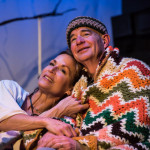In the hour of my death, would I regret that my life had no meaning? Should that be a regret, after all?
It seemed that some people—often those who offered sage advice about aging—advocated a search for meaning in one’s life. It was seemingly a noble cause. If you wanted to feel that you had successfully grown old, then you must find a meaning or a purpose for yourself.
I hadn’t done it yet.
I imagined the scenario at the end of my life. There I would be, my life blinking down to its very last moment. Would I be asking myself what my life meant? If I had followed the sage advice I would have my answer ready. My search for meaning and purpose would be over by then. If I had successfully aged, I would have found my meaning. Just before my life’s final blink, I would be able to answer myself: This was my meaning. This was my purpose.
Putting aside the question of whether, having discovered my meaning, I would be able to achieve it fully before that final hour, I had begun to question whether finding meaning and purpose was so important. In the end, who would know that I had found my meaning? For that matter, would I myself know that I had found it?
More important than finding meaning, it seemed to me, was choosing a way of being. A way of being was part instinct, part inclination.
Not being too mawkish about it, I chose a way of being that was motivated by kindness and appreciative of the kindness of others. It was a way of an open heart and an open mind. It was a way of seeking beauty and of finding joy in the beauty that I found. Beauty, I thought, was not just in the eye of the beholder. It was a shared experience, and being so it was so much larger than myself. Discovering how I could participate—exploring the extent of my own ability to create beauty—this seemed to be a worthy cause, a righteous purpose, even.
It was a pursuit of the awesome. It was an experiment in making my ethical will.
There was no end-point to this exploration, this quest for discovery. There was no meaning to be finally found. There would always be something that I could not reach. A way of being was not a goal. It was a process.
Views: 0
Some other stuff for later,
- 84
 This month, I have had the privilege of playing Neil in a community theater production of The Quality of Life, a beautifully-written, award-winning play by Jane Anderson. Neil and his wife Jeanette are living in a yurt on their property in the Berkeley Hills in Northern California after losing their…
This month, I have had the privilege of playing Neil in a community theater production of The Quality of Life, a beautifully-written, award-winning play by Jane Anderson. Neil and his wife Jeanette are living in a yurt on their property in the Berkeley Hills in Northern California after losing their… - 72
 The English version of this post—Becoming Neil—was posted here on March 29, 2016. This Spanish translation is my own and may contain errors. I invite native speakers of the language to comment on my errors and to suggest corrections. Aquí está una traducción en español de Becoming Neil. Me gustaría…
The English version of this post—Becoming Neil—was posted here on March 29, 2016. This Spanish translation is my own and may contain errors. I invite native speakers of the language to comment on my errors and to suggest corrections. Aquí está una traducción en español de Becoming Neil. Me gustaría… - 71Three years into exile, and I knew that I would become “old” soon enough. Maybe I was already. I hoped to be one of those people who enjoyed good health and a sharp mind right up until the end, but for many people, some sort of affliction came with the…
Comments of Late